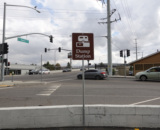In business it is a given that you need to know your customer, but taking it a step further and getting to know your customer’s customer proves you are committed to truly meeting all parties’ needs. What's on many truckstop and travel plaza customers' minds this summer? CSA 2010.
Travel plazas’ customer base, motor carriers and professional drivers, are just months away from a nationwide rollout of new safety protocols that will change the way they are rated on safety. The new safety protocol Comprehensive Safety Analysis 2010 (CSA 2010) takes effect nationwide in July and is already underway as a pilot project in nine states.
CSA 2010 first launched in February 2008 when the Federal Motor Carrier Administration began a field test with about half the motor carriers in Colorado, Georgia, Missouri and New Jersey. In 2009, FMCSA added all carriers in Montana, Minnesota, Kansas, Maryland and Delaware.
Under CSA 2010, FMCSA has assigned weighted values for violations and carriers will receive a monthly safety score. The score is comprised of seven behavior analysis and safety improvement categories, also called BASIC. They are: unsafe driving, fatigued driving, driver fitness, alcohol and drugs, vehicle maintenance, cargo securement and crash history.
The new system holds both carriers and drivers responsible for safety, making the pre-trip inspection for drivers even more important than it has been in the past. Minor violations uncovered during roadside inspections, such as a broken taillight, now result in points on the safety score. Another important change is that a warning for speeding counts the same as a violation. Crashes, regardless of fault, also add points to a score.
The goal of the program is not just to hold carriers responsible for safety, but also to determine why problems are occurring, recommend solutions and encourage corrective action. FMCSA has taken a multi-pronged approach to the investigation and enforcement of the new system and plans to work with carriers on a cooperative safety plan when necessary. For more information, visit the official CSA 2010 Web site at http://csa2010.fmcsa.dot.gov/.
As CSA 2010 takes effect, fleets and drivers will all be learning how the system works and how they can improve their own safety efforts. The program may also create new opportunities within the truckstop and travel plaza industry and the vendors that serve professional drivers. Read the April 15 issue of Highway Business Matters for details.
{HBM} Highway Business Matters is a brief semi-monthly newsletter created exclusively for companies that provide products or services to the truckstop and travel plaza industry. Highway Business Matters will keep you informed on trends, tactics, and tips to help you connect to the $65 billion truckstop and travel plaza industry.
Help tailor Highway Business Matters to meet your needs by sharing your feedback and story ideas. Send your input to: atoner@natso.com.
Subscribe to Updates
NATSO provides a breadth of information created to strengthen travel plazas’ ability to meet the needs of the travelling public in an age of disruption. This includes knowledge filled blog posts, articles and publications. If you would like to receive a digest of blog post and articles directly in your inbox, please provide your name, email and the frequency of the updates you want to receive the email digest.

